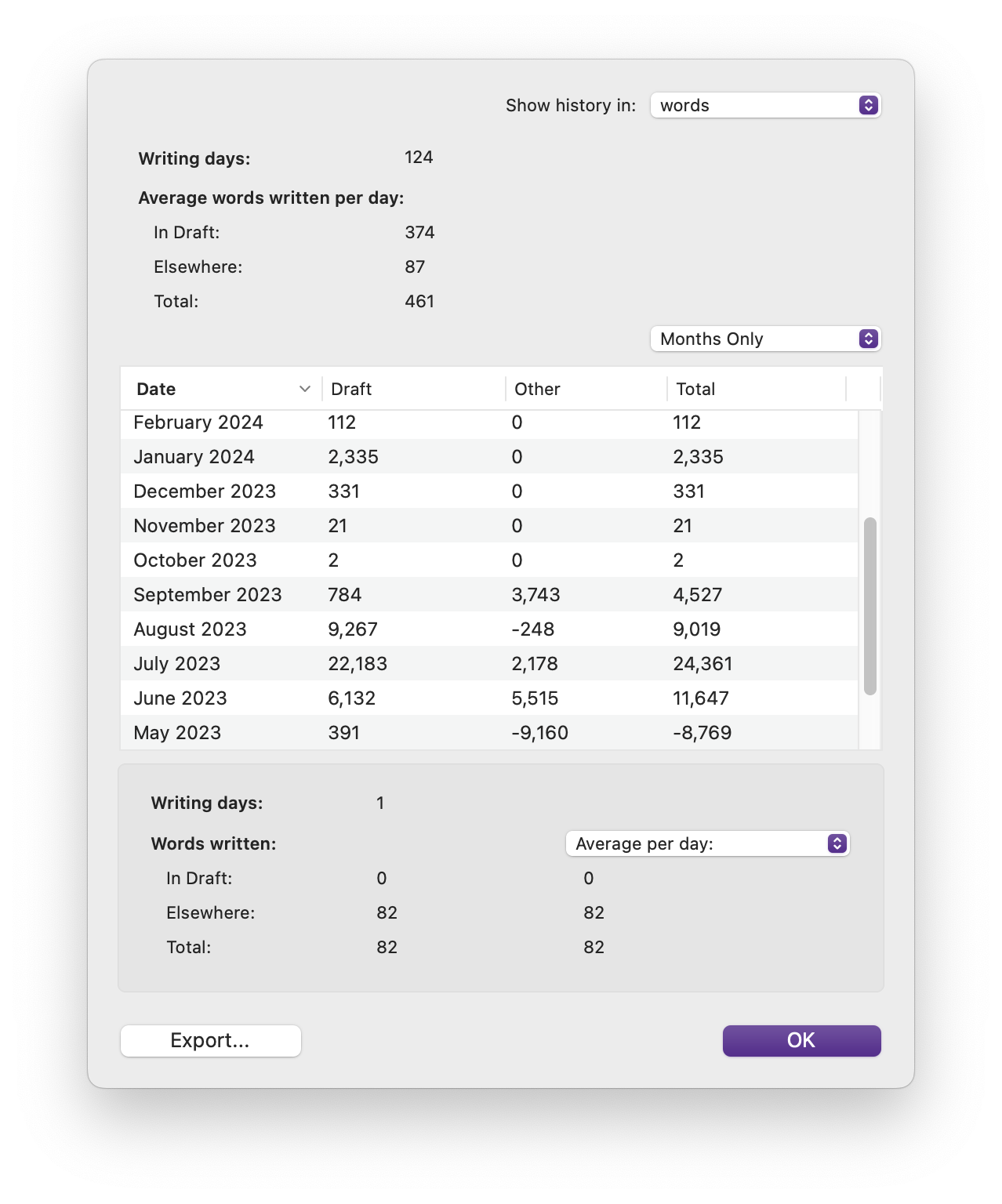The year is drawing to a close. It’s a good time to look back at your writing and evaluate your accomplishments.
The end is near; the end of the year, that is. The end of a year is a good time to carry out a year-end writing retrospective, to reflect on the progress you’ve made on different projects during the past twelve months. Let’s look at how Scrivener can help you quantify your writing progress for the year.
Evaluate goals
What were your writing goals for the year? Did you meet them? Did you, perhaps, exceed them? Did you finish projects, start new ones, and revise existing projects? Did you do NaNoWriMo this November, either completing a draft or writing a substantial chunk of a project you’re still working on?
Word count isn’t everything, but you can use Scrivener’s writing history feature to see how many words you’ve written in all your current projects. Just choose Project > Writing History in each of the projects that you’ve worked on this year.

If you didn’t reach your desired word count, maybe lower your goal for the next year. Remember, quantity doesn’t equal quality, but if you’re just working on your first draft, it can be helpful to get as many words down as possible before you start editing and revising.
Summarize accomplishments
Whether you’ve met your goals this year or not, look at the many things you have accomplished that might not be completed writing projects. Have you done research or honed your writing skills during the year? Have you taken any courses, read any books on writing, or participated in feedback groups? All of these things contribute to your writing, even if they don’t show up in your word count or in the number of projects you’ve completed.
Also, your Scrivener projects might not encompass all your creative endeavors. You may have also published blog articles, produced or appeared as a guest on podcasts, participated in a book club, or engaged in other tasks that contribute to your writing. You may have spent much of the year promoting a new book, and this can greatly reduce the time you have to write.
It can be helpful to make a list of all these accomplishments; even if you haven’t hit your main goal, look at all that you have done during the year. People often hope for big accomplishments, but sometimes lots of little accomplishments add to up progress that may not be visible, but that will pay off in the future.
Identify areas for improvement
Writing is complex, and being successful as an author requires that you constantly up your game and improve your work. It’s a good idea to look back at what you’ve written in the past year and think about what you feel is successful and what needs work. Do you need to focus more on dialog or setting, or should you pay more attention to character, world-building, or plot?
Try to find areas where you can refine your writing, and set these as goals for next year. You might want to plan to read some books or take some short courses in areas where you think you can improve the most. Or if you have a critique partner or are part of a feedback group, ask others to give you opinions on the areas you want to enhance.
Learn from setbacks
Maybe you didn’t finish the project you were working on, get an agent, or get published. Ask yourself why. It could be that you weren’t ready, that your writing wasn’t polished enough, or that you hit writer’s blockk. Learn from what you didn’t accomplish, and plan on overcoming obstacles next year.
It is not uncommon for a writer to quickly write twenty or thirty thousand words, then hit a wall. If this happens, examine why. Perhaps you’re a pantser – someone who doesn’t outline – and you just didn’t know where to go. Or maybe you do outline, but you got to a point where things didn’t feel right, where your characters didn’t jump off the page.
There’s no shame in abandoning a writing project, but it’s important to learn why you don’t feel the motivation to continue and learn from this so you can go further with your next project.
Read books
It’s important to read widely in many genres, but especially in the genre you write in, so you remain familiar with its conventions and norms, and to know what trends are popular. Every good writer is also a reader, and the books you read influence your growth as a writer.
The end of the year is a good time to think back on both your writing and your reading, and how the latter can inform what you write going forward. You might want to plan to read some books on writing or creativity – we have some suggestions here, here, here, and here.
You can’t do everything
Life often gets in the way, and if you weren’t able to meet your goals this year, it’s not your fault. Work, family, and other commitments, along with unexpected events, make it difficult to maintain a writing schedule. If you didn’t hit your weekly or monthly targets as often as you wanted, maybe lower your goals for next year. Don’t beat yourself up if you haven’t finished that project, but get motivated to finish it next year.
Come the new year, it can be helpful to look at this writing retrospective and use it to plan what’s next. We will discuss this in a follow-up article coming soon.
Kirk McElhearn is a writer, podcaster, and photographer. He is the author of Take Control of Scrivener, and host of the podcast Write Now with Scrivener.

